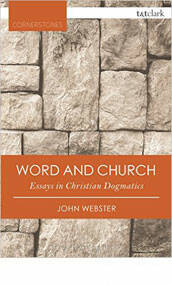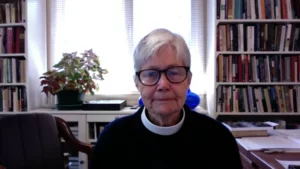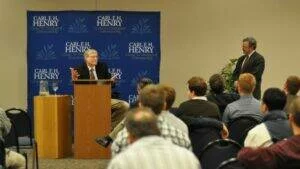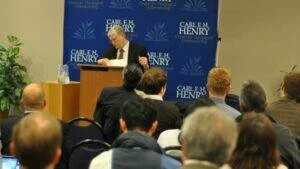John Webster’s Holy Scripture is arguably the most academically significant book in English to deal with the Bible from a theological point of view since the publication four decades ago of David Kelsey’s Proving Doctrine: The Uses of Scripture in Modern Theology.
Webster’s little book is widely cited and has been assessed by a variety of different theologians. Yet the first writing on the Bible I encountered by Webster was not his book, but an essay called “Hermeneutics in Modern Theology” (first published in Scottish Journal of Theology and later reprinted in a collection called Word and Church). This piece made quite an impact on me as a theology student when I initially read it, and aspects of it continue to guide my thinking today. It is not that I consider it a flawless portrayal of biblical hermeneutics, but Webster’s attempt to say what is missing in contemporary discussions of the Bible, and his effort at least to begin to fill that gap, constitute to my mind a model of the sort of contribution that a systematic theologian can make to the study of the Bible.
Three aspects of the essay have been especially instructive for me.
Theology and the Flow of Intellectual History
First, it is noteworthy that Webster’s authorial voice is a bit like one calling in the wilderness. He is clear that he is disappointed in the condition of contemporary theological reflection on the Bible. Risking sounding slightly imperious, he says, “Strict governance by Christian doctrine is largely absent from much contemporary Christian writing in hermeneutics.” The essay is an attempt to provide a doctrinal account of reading Scripture, and as the first step in the process Webster sketches out what it means for theology to be absent in the way that he thinks it should be present. This is, in very brief compass, an explanation, not of the eclipse of biblical narrative, but of the eclipse of theology in providing a depiction of the Bible and the wider field in which it is read. Unlike many involved in the current discussion, Webster does not take for granted that the appeal to theological language should be grounded in a more general theory of hermeneutics, or even that theology may only supplement such theories, which may be taken to have a broader appeal than any form of thought that is tradition-specific, as Christian theology is.It is best not to put too much weight on intellectual historical issues, even where those considerations can help in framing a proposal. This involves him in making a deep, fundamental objection against the status quo in matters of interpretation. Anyone making this sort of claim is bound, before long, to provide an account of how we got to the place where all is not well.
Those who proffer such views are sure to meet with their fair share of resistance. But Webster proves himself savvy in the way that he makes his case. Some theologians who want to stake out a minority position and explain how mistaken assumptions came to guide inquiry begin with quite sweeping dismissals of whole periods in the history of ideas. These blanket rejections of centuries of reflection are none too easy to establish by means of detailed argument, and are likely to be challenged by specialists. Perhaps an intellectual historian would be up to the task of giving a careful defense of a broad characterization of whole periods of time, but few theologians are. (Perhaps Hans Frei counts as an exception here, though he probably did not get as far as a constructive theologian because of all the work he did on the history of the Bible—as useful as that work still is.) Webster, to his credit, does not rest all that much weight on his initial historical reflections. He proceeds mostly via surveying current works in theology, biblical studies, and hermeneutics, and he only ventures a few overall considerations of how history came to be where it is, building on a very impressive essay from Paul Riceour. All of this to say that there is a methodological point that today’s theologians can learn from Webster. It is best not to put too much weight on intellectual historical issues, even where those considerations can help in framing a proposal. It is best to let theology lead the way.
Clarity of Confession and Clarity of Thought
Second, while Webster bemoans the general lack of influence on the part of theology within contemporary discussions of the Bible, he concedes that confessional Protestants might be considered a counter-example to the wider trend he charts. If such theologians have already written “an entire armoury” of doctrinal material on the Bible, as they have, why does that not count as an effective way of addressing the neglect of theology on the contemporary scene? If these works exist, why have they exercised little sway upon academic culture? Webster explains, “their relative lack of sophistication, their entanglement in polemics and apologetics, their reliance on scholastic or nineteenth-century construals of the nature of the Bible and their generally rationalistic understanding of theological method have all contributed to the marginalization of this strand of Christian thought.” It is hard to deny the basic point here.
This passage—as well as the whole essay, together with Webster’s other writings on Scripture, and indeed his entire corpus—serves as a good reminder that clarity of confession need not be inversely proportional to clarity of thought. If it actually matters what one takes to be true, if theology’s claims are really to count, then it will not be sufficient for theology’s role to consist simply of playing an endless game of whack-a-mole, in which the theologian denounces whatever error is currently drawing the most attention to itself and generating the most buzz. No, something more is required. And the basic requirement is fairly simple, that is, to attempt to add something to discussions of important topics, rather than restricting oneself to articulating dissatisfaction and then re-affirming that the church should feel satisfied that it already knows everything of consequence. Readers of Webster’s works may not find themselves in agreement with everything that he says, but they must all admit that he has made several noteworthy contributions to discussions of the theology of Scripture (and other topics). In “Hermeneutics in Modern Theology,” he cites several theologians who are also seminal contributors to theological reflection on Scripture, and who might count as a sort of confessional Protestant. The church would be better off if more would follow their and his example. An adequate theology of Scripture is not something that the academy and church already possess, but something that they ought continually to strive to develop and refine.
Situating the Bible in the Web of Christian Doctrine
Third, it is the basic approach at work in the essay from which I learned the most. The goal of “Hermeneutics in Modern Theology” is to develop a constructive proposal for how to think theologically about the Bible and its interpretation. It is an implicit caution to readers that they should not assume they know what the Bible is, or even who they are as interpreters of it, unless they have thought of the entire “hermeneutical situation” in relation to God. The text of Scripture is subservient to the Word of God, to which it testifies. The reader is not one who approaches the topics on which the Bible speaks fully competent to address them herself already; One must read the text repentantly, leaving behind sinful patterns of thinking and living as one receives new life in Christ by means of the text’s testimony to the incarnate Son of God.rather, one must read the text repentantly, leaving behind sinful patterns of thinking and living as one receives new life in Christ by means of the text’s testimony to the incarnate Son of God. Webster concedes that the theologian can profit from drawing upon philosophical tools such as speech-act theory, but if the theologian as such is going to contribute to discussions of reading the Bible, this is surely going to happen only if the theologian is willing to deploy theological materials. And it is certainly true that the theological considerations Webster mentions orient reading and give it a certain sort of direction that methodologies in reading should respect, honor, and seek to fulfill.
There are questions worth asking about the details of how Webster characterizes the text of the Bible, what the text testifies to, who the readers of Scripture are, and the nature of the interpretive community. For example, as an essay that shows an obvious debt to Karl Barth, it is more skeptical of general hermeneutical theory than Barth himself was. Why is that? Is it necessary to be this critical of general theory? Yet there are several things that this essay taught me or reinforced in my thinking. And for that, I am deeply grateful that I encountered “Hermeneutics in Modern Theology” many years ago, and I am confident that I will continue to read and re-read it into the future. I would invite others to do the same.









Comments
Be the first one to make a comment!